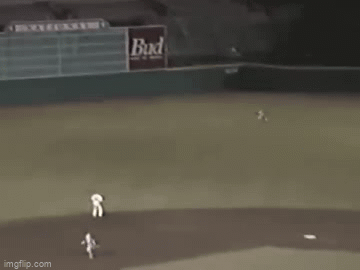Remembering Chuck Carr
The high-flying center fielder, who died at age 55, was one of the Marlins' first stars.
Chuck Carr always believed in himself.
The 1990s speedster, who died at age 55 after battling cancer, was one of the first stars of the Marlins franchise.
Carr's family announced his death on Facebook, remembering his warmth and heart.
"Always life of the party and always striving to put a smile on everyone’s face no matter if you knew them or not," Rakieem Mookie Salaam wrote, calling Carr his Superman and childhood hero.
The bullet-fast California native was drafted by the Reds in 1986 and bounced from the Mariners to the Mets before reaching the majors in 1990.
He washed up with St. Louis in 1992 and moved to the expansion Marlins in 1993. Carr had the inside track to secure the Marlins' starting centerfield job, but he batted .167 in Spring Training, so Scott Pose got the nod instead.
"I may end up in the Hall of Fame and look back at this and say, 'Can you believe I didn't start the first day?'" Carr said.
Carr’s Hall of Fame induction never happened. But soon enough the starting job was his, and he wound up stealing a league-leading 58 bases that season and setting the tone for a young team. The Marlins’ man of steal dove and scaled walls and made one-handed catches and threw darts home to nail runners at the plate.
As Dan Le Batard wrote in a 1993 column, "You get the impression he would dive on asphalt and glass if it meant getting an out. ... Carr genuinely believes that every ball hit around him deserves to die in his glove."
But for all of his vibrance, and despite becoming a fan favorite, Carr didn't do enough of the basic things that baseball people tend to prefer. Like hitting home runs (only 13 in his MLB career). Or getting on base (his career on-base percentage was .316, anemic for a leadoff hitter).
He was too showy and too pretentious for the staid ballgame.
Carr looked back fondly on his Marlins years after moving on to Milwaukee.
"I was there when history was made," he said in a 1996 interview. "I had three good years there. I just hope someday, people will be sitting around down there saying, 'Remember that Carr guy who used to make those diving catches?'"
After suffering a devastating knee injury, Carr was trying to get back to form and his team's good graces during a May 1997 game against the Angels. He worked the count to 2-0, and got a “take” sign. But Carr, with his .130 batting average, wasn't listening to that. He swung through the “take” sign and popped out.
"That ain't Chuckie's game. Chuckie's hacking on 2-0," manager Phil Garner recalled him saying (Carr later denied he said the quote, even though it stuck anyway).
He was sent packing to Triple-A and, instead of accepting the demotion, asked for his release. He believed he could contribute to a big league team, and as it turned out, he was right — Carr was scooped up by Houston and helped the Astros win the NL Central.
Carr was hacking in the divisional series against Atlanta, and he hit a home run against John Smoltz. It was the final swing of his big league career.
In the years that followed, Carr continued playing in the farthest reaches of the baseball world: China, Mexico, Atlantic City, Italy.
He wasn’t ready to stop chasing the dream. Carr still believed in himself, naturally, and he felt he still had something to offer.
He wanted to turn back time, and who could blame him for thinking he could? He was Superman, after all, a teal blur. We saw him fly.



